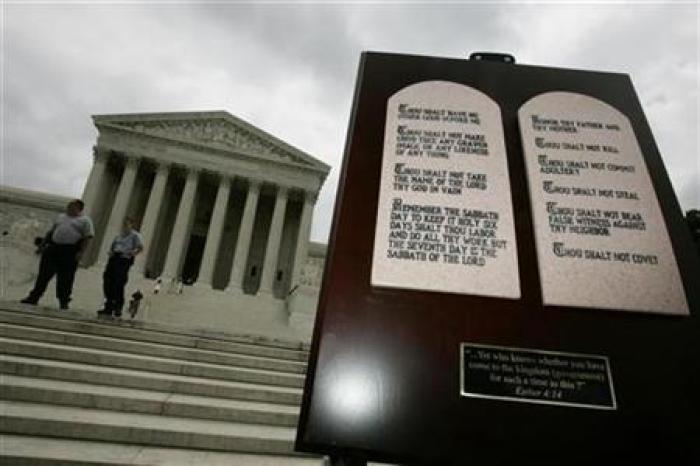Atheists Demand 'No Gods' Statue in Arkansas After State Approves Ten Commandments Monument

After a statue of the Ten Commandments was officially approved to be erected on the grounds of the Arkansas state capitol last month, a Wisconsin-based group called the Freedom from Religion Foundation is demanding that a statue be erected representing atheism.
While the Ten Commandments commands Christians to honor "the Lord thy God," the FFRF statue would offer the opposite, "there are no gods."
"There are no gods, no devils, no angels, no Heaven or Hell. There is only our natural world," the statue would read, according to a letter sent to Arkansas Republican Gov. Asa Hutchinson, who signed the bill in April. "Religion is but myth and superstition that hardens hearts and enslaves minds. Freedom depends on freethinkers. Keep state and church separate."
"The first commandment, 'Thou shalt have no other gods before me,' is reason alone to have vetoed the Ten Commandments bill that passed your legislature this year. It is not the business of the state of Arkansas to tell citizens which gods to have, how many gods to have or whether to have any gods at all! It is not the business of the secular state of Arkansas to endorse one set of religious edicts or another, or religion over non-religion," it continued.
While the Ten Commandments statue will be on government property, its construction will be funded by private money.
SB 939, which was submitted by Sen. Jason Rapert, R-Bigelow, passed both chambers of the state legislature and states that while a 10 Commandments monument would be placed on capitol grounds, the state of Arkansas is in no way supporting one religion over another.
"The placement of the monument under this section shall not be construed to mean that the state of Arkansas favors any particular religion or denomination over others," the bill reads, in part.
The FFRF isn't the only organization vying to have a monument built on state grounds in response to the Ten Commandments. The Nevada-based Universal Society of Hinduism also submitted a proposal to have the monkey god Hanuman's image built in stone near the capitol.
"Besides honoring the Arkansas Hindus, this statue would raise awareness of Arkansans about Hinduism, the oldest and third-largest religion of the world with about one billion adherents and a rich philosophical thought," leader Rajan Zed told reporters.
The project would have also been funded by private money, but the proposal was rejected not long afterwards.
This isn't the first instance that a Ten Commandments monument has withstood challenges. In Van Orden v. Perry, the U.S. Supreme Court ruled in 2005 that a Ten Commandments monument at the Texas state capitol could stay. The justices at the time said the biblical laws were one of 17 monuments there that represented influences on Texas history.




























